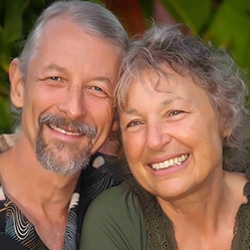
Search Results: helping
-
Enjoy listening in as Arnina assists participants in fine tuning what they wish for their futures, and what practices they intend to embrace as the course winds down. She also offers strategies for what they can do if they forget their intended practice, and revisits the importance of untangling Needs from Core Belief.
-
Trainer Tip: The Nonviolent Communication process strengthens our ability to remain human, even under trying conditions. It provides tools to promote peaceful living on a daily basis. Be aware today of the times that your behaviors or attitudes promote distrust and self-protection, rather than compassion and humanity.
-
Trainer tip: When you want to thank someone expressing what that person did, how you felt about and what needs were met for you, can provide the other person with more information. It can also help her more fully understand how she contributed to you, and deepen your connection with her.
-
Trainer tip: Demands are more likely to limit the possibilities and create distance between people. The trick to asking something as a request is valuing everyone’s needs equally. When you value everyone’s needs equally, then you are more willing to come to solutions that satisfy everyone. It thus opens possibilities and helps build connection.
-
Trainer tip: When we focus on needs further possibilities are more likely to open up. When we focus on a particular strategy, our world can feel scarce and conflicts can arise. Resolution comes when we value everyone’s needs and seek mutually satisfying solutions. We can ask for support towards this outcome.
-
Trainer Tip: We have a better chance of getting our needs met if we prioritize connecting with one another's needs more than being right. This way we can reduce the chances of conflict arising. We also increase the possibility we can find ways everyone’s needs can be met.
-
Observation is the awareness of our sensory perceptions and thoughts, separate from evaluations and judgments. Feeling involves bodily sensations and emotions, distinct from "faux feelings" that mix thought and emotion. Needs encompass universal human requirements for survival and wellness, while thoughts and evaluations express needs. Requests are rooted in connection and invite true willingness, rather than demanding compliance.
-
Trainer Tip: Notice if something within your agency will bring you the serenity you want. If not, then notice the needs you are trying to meet by wanting to take that action. Then then choose another action that's more likely to have the desired effect.
-
Observation is the awareness of our sensory perceptions and thoughts, separate from evaluations and judgments. Feeling involves bodily sensations and emotions, distinct from "faux feelings" that mix thought and emotion. Needs encompass universal human requirements for survival and wellness, while thoughts and evaluations express needs. Requests are rooted in connection and invite true willingness, rather than demanding compliance.
-
Inspired by Marshall Rosenberg's teachings, Kathleen Macferran's self-empathy exercise offers a transformative approach for those challenging moments when you fall short of your own expectations.
-
Trainer Tip: When I am in resistance to what is happening in my life, when I'm having a very difficult time enjoying or just being with what is occurring, I like to offer up my gratitude.
-
An anchor awakens parts of you that can access a bigger perspective. Also, it can reduce your reactivity, increase conscious relating, and support self-compassion. An anchor helps you get a little bit bigger than the reactivity you are experiencing so that you can access a wiser discernment. It is simple, and can be done anytime and anywhere. Learn to direct your attention to develop your anchor in self-empathy.
-
Our inner world shapes what we do, including the results we see in relationships and social change efforts. Physical and verbal actions are expressions of what’s happening in our minds. If we want certain outcomes, it helps to be mindful of the intentions we plant within ourselves.
-
Join CNVC Certified Trainer Jori Manske in an exploration of how gratitude can enable you to remain more present moment to moment, thus enabling you to flourish in your life!
-
Developing interpersonal relationship skills in congregations is integral to working with the conflicts that arise. These skills can be applied to any spiritual community.
-
In this brief audio segment, Miki works with a woman whose teenage daughter rejects her use of NVC, guiding her in a process of self-awareness and acceptance.
-
Trust, flow, information sharing, and learning is reduced in conflict. Conflict can indicate incapacity in at least one of five systems that every group, community, or organization needs to function. Attending to conflict at systems-level helps reduce over relying on momentary connection that isn’t anchored in decisions about what comes next. When there's enough agreed upon systems within capacity, that attend to enough kinds of situations, we're likely to have little conflict.
-
Jim and Jori share their work integrating Martin Seligman's work on Positive Psychology with Nonviolent Communication in a system they call REMAP, focusing on relationships, engagement, meaning, accomplishment and positivity.
-
Learn how Nonviolent Communication (NVC) can improve the quality of your personal and professional relationships, one interaction at a time.
-
Inspired by Marshall Rosenberg's teachings, Kathleen Macferran's self-empathy exercise offers a transformative approach for those challenging moments when you fall short of your own expectations.



















